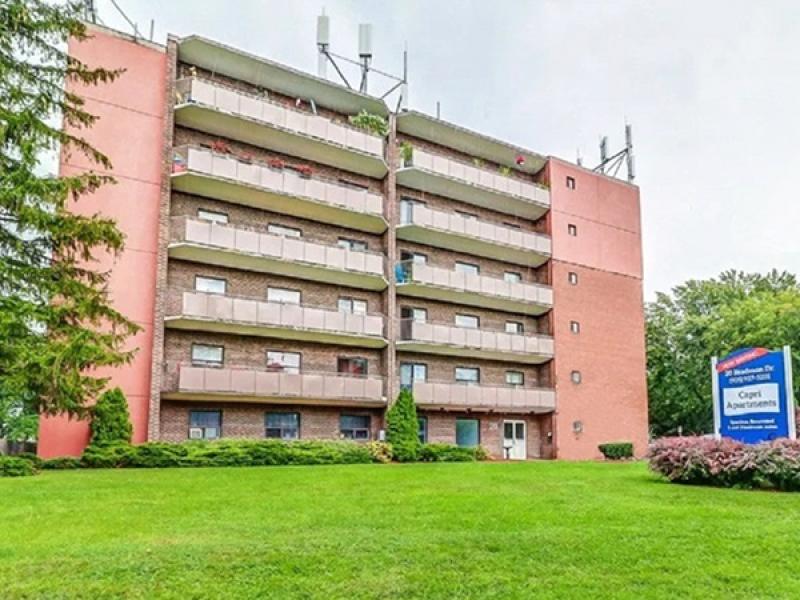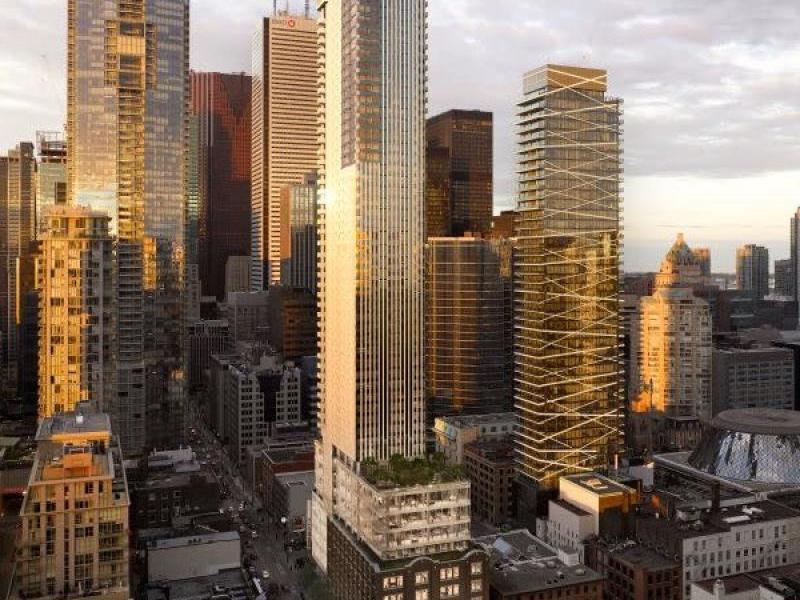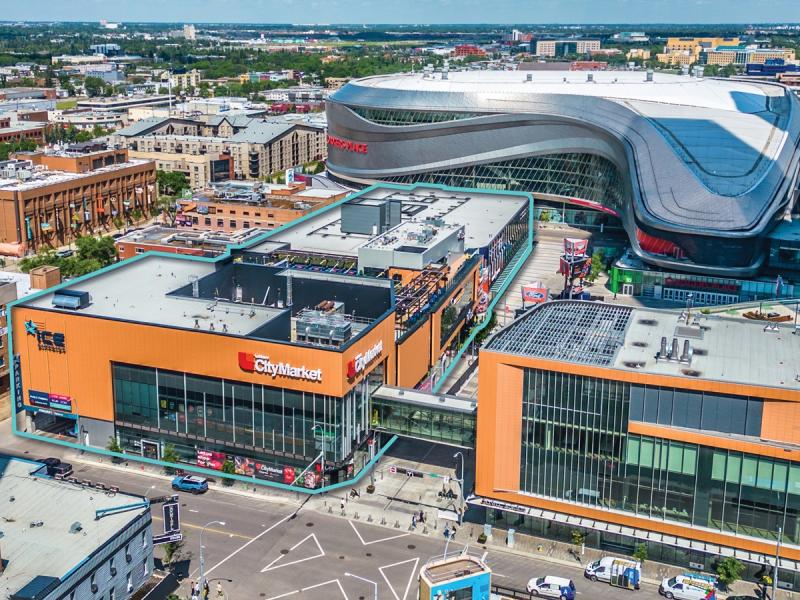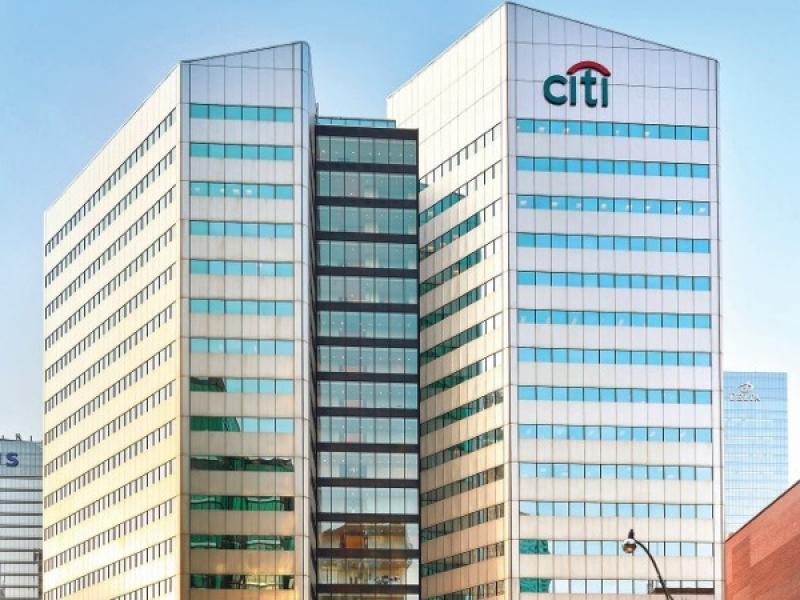
Robert White, left, and Jacques Gordon speaking at the 2018 Global Property Market conference in Toronto. (Steve McLean RENX)
Two speakers with international perspectives addressed worldwide capital flow and issues shaping investment to open the Global Property Market conference on Nov. 27.
LaSalle Investment Management global strategist Jacques Gordon told the audience at the Metro Toronto Convention Centre that capital markets are alive and healthy and real estate fundamentals are well-balanced. While he expects real estate investment performance to be below that of the past five years, he believes it will remain “a low-correlation diversifier” to stocks and bonds going forward.
“Build your portfolio in such a way that it’s ready for what uncertainties may show up,” said Gordon. “Where you’re looking for relative value, take those uncertainties into account.”
Tracking global transactions
Robert White, who founded Real Capital Analytics, Inc. 18 years ago, said sales of individual assets were a bit muted through the first three quarters of 2018. Real Capital tracks transactions and investments in more than 120 countries, including $1.5 trillion in significant commercial real estate transactions in 2017.
Next year’s sales should look a lot like 2018, which White said isn’t such a bad thing considering investors are still under-allocated to commercial real estate, capital is being rational and backing off from markets which look like they’re overheating, and investors are being cautious and pricing in risks in real estate markets.
Prices are still increasing somewhat despite slowing transaction volumes.
“Declines in transaction activity don’t indicate a weakness in the amount of equity that wants to be in real estate,” said White. “There’s been a tremendous amount that’s been raised and has yet to be invested.
“There are even more funds that are far from their target allocations.”
Hottest countries for transactions
While transactions cooled off in Canada and much of Europe and Asia through the first three quarters, the United States, France, Brazil and India showed growth.
“REITs are going to take India into another stage of development and maturity,” said White. “We’ve seen the smartest and largest investors around the globe — GIC, Blackstone, Brookfield and a number of Canadian pension funds — be significantly active in India for a number of years. But over the past 12 to 18 months, they’ve significantly increased their investments.”
South Korea and Hong Kong have been the hottest countries in terms of investment activity this year, according to White. Investment in Hong Kong grew by more than 60 per cent through three quarters, compared to the same period in 2017, with most of the money coming from Hong Kong and China.
Hong Kong buyers have also been very active in London, England during the past year.
South Korea’s growth was just behind Hong Kong, but still above 60 per cent, and White expects the country to remain hot through 2019.
South Korea, Hong Kong opportunities
“South Korea has clearly entered the global property landscape. It will have record volumes this year and is having record-breaking cross-border inflows and outflows.”
Acquisition of land rights in China was valued at close to $600 billion in 2017, according to White.
“For what developers paid for land rights in China last year, they could have bought everything that sold in North America or everything and more that sold in Europe,” he said. “It’s a huge phenomenon, and tremendous real estate wealth is being created there.”
There’s been a decline in Chinese real estate investment in other parts of the world, most notably the U.S. and Australia. The drop in outbound capital is largely attributable to government-regulated and state-owned enterprises.
While Brexit remains a spectre haunting Europe, Gordon said investment activity remains strong in all countries and is back to the peak level of 2007. European investments are much less leveraged now than in the last decade, he added.
Cities more important than countries
Capital has been very focused, with investments in the top 20 metropolitan areas around the world representing about 60 per cent of all activity through three quarters, according to White. New York City, Los Angeles, London, Hong Kong and San Francisco are the top five markets, and no Canadian cities are in the top 20.
White said London has performed better than expected despite an initial post-Brexit vote price correction.
“London shows you how deep the capital markets are. When all of the A-list investors wouldn’t touch London, and many of them became sellers, there was a whole other rung of investors — including groups that I hadn’t heard of or wasn’t aware of before — that came in. This was their opportunity because they’d been closed out of London by bigger players for many years.”
White said investors are focused on liquidity and his clients want to be in global markets at the periphery of central cores.
“You’re going to be paying high prices wherever you go, so make sure you go somewhere smart,” said Gordon.
Hot property investment sectors
Industrial and logistics facilities lead property sectors in terms of interest. White said industrial investment activity will overtake retail for the first time in his company’s recorded history this year — and should stay there.
“Industrial has become the sexiest asset class out there and people can’t get enough of it. We’re seeing newly built Amazon distribution facilities in the U.S. trade at cap rates that are arguably the same or lower as what a trophy tower in midtown Manhattan might command. That shift clearly comes at the expense of retail.”
Gordon said logistics facility construction, demand and prices are up significantly. He thinks the sector will remain hot for another two or three years before it could become prone to a cyclical downturn.
More investors are diversifying into the multi-family rental apartment sector around the globe. The seniors housing and care sector is still small but growing, and it’s endemic of a shift into niche property types such as self-storage, medical offices, data centres and student housing.
The U.S. has the biggest retail problem because it has so much more of it than other countries, White noted, as the sector was never overbuilt in Europe or Asia.







